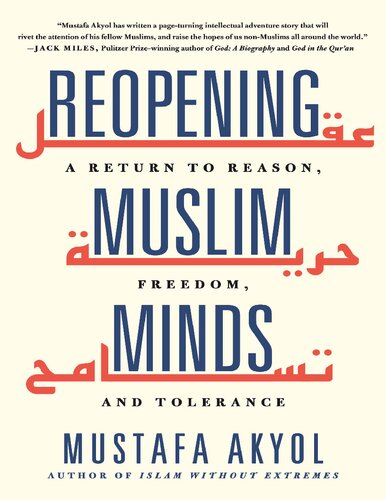
Reopening Muslim Minds
A Return to Reason, Freedom, and Tolerance
کتاب های مرتبط
- اطلاعات
- نقد و بررسی
- دیدگاه کاربران
نقد و بررسی

January 25, 2021
In this thoroughly researched and fervently argued book, Turkish journalist Akyol (The Islamic Jesus) follows the development of Islamic thought from its golden age of philosophy and science to today’s strains of conservative orthodoxy. Akyol surveys prominent thinkers (particularly 12th-century Andalusian polymath Ibn Rushd), writers (among them 11th-century Persian philosopher Al-Ghazali), and even important fictional characters such as Hayy ibn Yaqzan, the protagonist of a popular 12th-century tale. He also challenges the idea that “Islam, right from its core, has been an unusually dogmatic religion” and “an exceptionally rigid and absolutist version of monotheism.” The reality, he argues, is that restrictions on intellectual freedom within Islam were a result of political expedience—specifically medieval sultans interested in preserving their own authority—rather than any features inherent in the religion. Akyol’s analysis serves as a theology as well as a history, advocating for a more tolerant and open Islam based on the primary teachings of the Koran, though readers unfamiliar with Islam will have a hard time following the author’s theological reasoning. Scholars of Islam, and especially Muslims interested in the faith’s future, will find Akyol’s take trenchant and satisfying.

February 15, 2021
The stereotypical view of Islamic religious philosophy is obedience to those who have religious authority, and a narrow literalist interpretation of the scriptures. Further, values like freedom, tolerance, and reason are antithetical to Islamic theology. Akyol (Islam without Extremes, 2011) here traces the development of Islamic philosophical thought and celebrates its rich legacy. Chapters outline the development and evolution of philosophical thought, and its complex interplay with the political powers of the time. Throughout the narrative, readers will find ideas that are firmly grounded in Islamic scripture and embrace notions of free will, freedom, rationality, and inquiry. Some of these philosophies were further refined to be practical working models in society. References to contemporary Western society are numerous, and sprinkled throughout the narrative (not surprising given the author's more liberal religious views). Rather than a history of philosophy, the book blends the influence of political currents that shaped the concurrent philosophical dialogue, and ultimately the predominant religious view. In addition, it explores the intent these injunctions sought to accomplish, and applies them to contemporary society. The text is fluid, the ideas profound, and the book is recommended for any reader. Some background knowledge of Islam is required.
COPYRIGHT(2021) Booklist, ALL RIGHTS RESERVED.

February 15, 2021
A cogent appeal for an Islamic enlightenment based in Islamic values. Akyol, author of Islam Without Extremes and The Islamic Jesus, presents a well-prepared argument for "finding Enlightenment values--reason, freedom and tolerance--within the Islamic tradition itself." The author explains that early Islamic history spawned two broad ethical schools, one of which he characterizes as "ethical objectivism theory," the other as "divine command theory." The latter rose to prominence in the form of Ash'arism, a Sunni school of theology that stresses the role of scriptural and clerical authority. Ash'arism, writes Akyol, "won the day not because of its merits, but because of the support of the states that ruled the medieval Muslim world." The author shows how authoritarian states have dominated Islamic history, using the divine command theory of ethics to uphold their power. According to Akyol, this trend has continued into the modern day, supporting authoritarianism and its attendant lack of freedoms. The author, who has spent much of his career studying and clarifying many aspects of Islam, calls on readers to ponder the early Islamic scholars who championed reason, science, personal liberties, and self-determinism, showing the importance of implementing these values in a modern Islamic enlightenment. Akyol especially highlights the 12th-century philosopher Ibn Rushd, known to the West as Averroes. He also calls on believers to mine the Quran for lessons in peace and personal freedoms that Ash'arism has suppressed through the centuries. "The big remedy we need...is really having 'no compulsion in religion.' It is, in other words, giving up coercive power in the name of Islam," writes the author. "This means no more religious and moral policing, no threats to apostates and 'innovators, ' no blasphemy laws, no public flogging or stoning, and no violence or intimidation in the family." An exchange of liberalism for legalism, he maintains, will solve this dilemma. A clarion call to restore long-diminished traditions in Islamic thought.
COPYRIGHT(2021) Kirkus Reviews, ALL RIGHTS RESERVED.

Starred review from March 1, 2021
Akyol (Islam Without Extremes; The Islamic Jesus) outlines the development and evolution of Islamic religious thought, starting with the Umayyad Caliphate (the first Islamic dynasty), through the modern era. The intent of this latest book is to present a rich legacy of Islamic thought that was inspired by scripture and which aimed to give believers guidelines for a pious life and a framework for Islamic societies. Interestingly, indigenous notions of freedom, tolerance, and rational belief can be found embedded in Islamic religious thought. The narrative successfully outlines the interplay between religious and political structures within various Islamic societies, and how that interaction seeded novel ideas which addressed the needs of that society. The author continues to explore the intent of these ideas and how they can be applied to modern society. References to contemporary non-Islamic ideology are numerous and sprinkled throughout. Although all readers will gain insight, the book requires a basic understanding of Islam in order to be fully appreciated. VERDICT This insightful book blends histories of religious belief, political change, and societal needs, to provide a coherent narrative outlining various undercurrents that shaped and ultimately determined predominant religious views. Highly recommended for readers interested in Islamic religious thought.--Muhammed Hassanali, Shaker Heights, OH
Copyright 2021 Library Journal, LLC Used with permission.

























دیدگاه کاربران